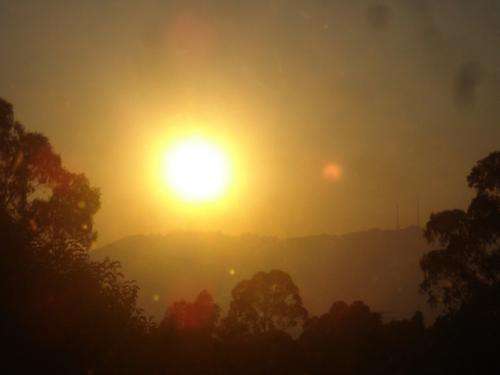Experts urge caution when rebuilding after disaster

As Australia prepares for a season of heatwaves, bush fires and other extreme weather events, experts have urged disaster-hit communities to learn from past mistakes and resist the rush to rebuild things the way they were.
Climate change modelling shows that extreme weather events including flash floods, cyclones and droughts are likely to become more common.
However, an international research project involving the National Climate Change Adaptation Research Facility, hosted by Griffith University, has found that communities and governments sometimes fail to adapt to the increasing risk.
"Often, following a disaster, there is an option to 'build back better' but this requires considerable political will and financing. It's more common to simply rebuild in a desire to return to normality as soon as possible," said Dr Sarah Boulter, Research Fellow at the National Climate Change Adaptation Research Facility, who is presenting her findings at the Australian Academy of Science's Science for a Green Economy conference in Sydney this week.
"It's hard to imagine that if disasters increase or worsen under climate change that governments can continue to be relied on as the insurer of last resort."
The research project, titled Learning from experience – Historical case studies and climate change adaptation, noted that following Cyclone Tracy in 1974, Darwin authorities put a six month ban on rebuilding to allow time to develop a new cyclone-proof building code.
That kind of response, however, is rare, said Dr Boulter.
"In many communities, often there's a sense that 'We won't be beaten by these events'. There is building and construction that goes on that still puts people at risk," she said.
Sometimes, a lack of communication means people are not even aware they are building their home in a flood plain or bush fire prone area or fail to appreciate the growing risk of disaster striking again.
"With a long, hot summer on the way, I think the experience of heat wave and bush fires in 2009 are foremost in people's mind and I expect that preparations will reflect many of the lessons from these events. Certainly, with the hot weather we saw last week in the southern states there was considerable and early warning to the community to be aware of the risk of hot weather," she said.
"What is less clear, is whether the community is more aware of the risk and willing to respond. The challenge for climate change adaptation is to learn from these experiences and develop strategies to convince communities that they are at risk and need to plan and act for the future."
The upfront expense of climate change adaptation can present a problem for governments in the short term, she said.
"In the face of the climate change, investing in infrastructure that will be resilient under greater pressure—such as electricity supply infrastructure that copes with increased heat, roads that are less likely to be flooded and cut off food supplies and so on—is difficult for both governments and private industry."
Dr Stuart Corney, a Climate Systems Modeller at the Antarctic Climate and Ecosystems CRC said there is a lot of research to suggest extreme weather events are going to become more common.
"We have done modelling on flash flooding in Tasmania where a 1-in-200 year event is projected to become more frequent than 1-in-20 years," he said.
"That changes the way you have to plan for things," especially long-term infrastructure such as dams, he said.
"Climate change is going to win in any situation. You might get variability, but if the trend is toward increasing fire danger and increasing floods, then it will only get worse."
The insurance industry and local councils are paying close attention to climate change modelling as they try to manage risk, he said.
"Local councils are worried about it and they want information they can base their decisions on. They know there are planning issues but they can't make arbitrary decisions because they will be challenged in court over it."
The federal government has taken steps to combat climate change and is keeping abreast of the research, Dr Corney said.
"However, responding to climate change involves both government and society and ultimately it will involve difficult political and economic decisions on a global scale."
Provided by The Conversation
This story is published courtesy of the The Conversation (under Creative Commons-Attribution/No derivatives).

















